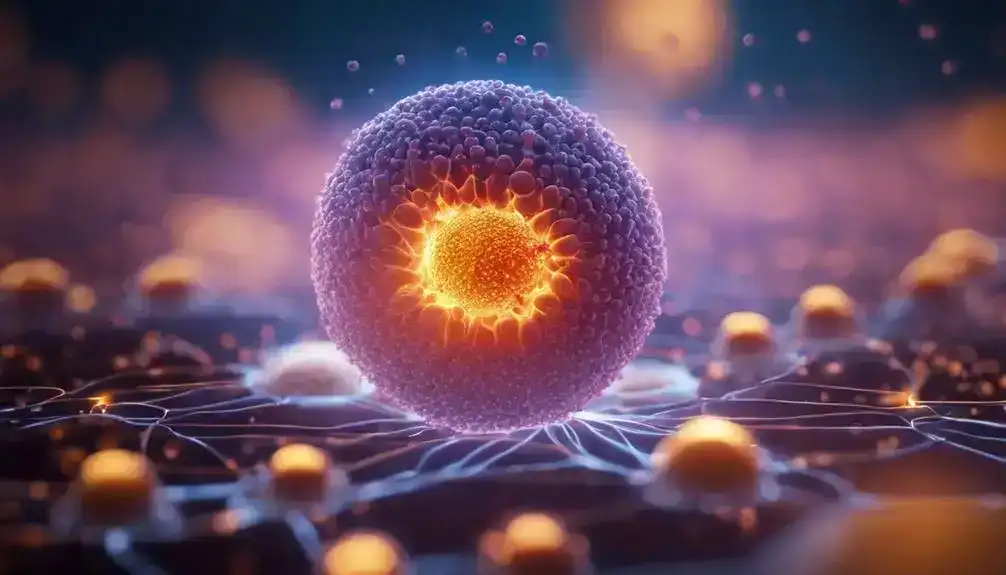Research indicates mixed findings on the link between caffeine in coffee and breast cancer. Studies suggest an inconclusive association, with some potential risks for specific subgroups like women with benign breast disease. Further investigation is essential to fully understand the impact of caffeine on breast cancer risk.
While some studies hint at a possible inverse relationship between caffeine intake and breast cancer, the complex interactions between hormones and antioxidants need deeper exploration. The nuanced nature of this topic warrants a closer examination to determine if caffeine poses a risky or safe association with breast cancer.
What Is the Overall Link Between Caffeine and Breast Cancer?

The overall connection between caffeine consumption and breast cancer remains inconclusive based on current research.
Some studies suggest a potential increased risk in specific subgroups, such as women with benign breast disease.
Further investigation is necessary to fully understand the complexities of how caffeine may impact breast cancer risk.
Potential Increased Risk in Specific Subgroups
In exploring the potential increased risk in specific subgroups related to caffeine consumption and breast cancer, consider the following points:
- Women with Benign Breast Disease may have a higher risk of breast cancer with increased caffeine intake.
- Specific breast tumor subtypes, like ER-PR- tumors, have shown a positive association with caffeine consumption.
- Understanding these relationships can aid in tailoring preventive strategies for at-risk populations.
Women with Benign Breast Disease
Research suggests a potential increased risk of breast cancer associated with high caffeine intake in women with benign breast disease. Understanding this connection is essential for tailored prevention strategies and personalized dietary recommendations.
Further investigation is needed to elucidate the specific mechanisms underlying this potential risk. Women with benign breast disease may benefit from moderation in caffeine consumption as part of overall health recommendations for reducing breast cancer risk.
Specific Breast Tumor Subtypes and Caffeine Consumption
Have specific breast tumor subtypes shown a significant association with caffeine consumption in relation to breast cancer risk? Specific subtype analysis reveals a notable impact on tumor progression.
For instance, ER-PR- tumors exhibit a positive link with caffeine intake. Understanding these specific relationships can aid in tailoring prevention strategies.
Further research is pivotal to ascertain the complexities of caffeine’s influence on distinct breast cancer subtypes.
Comprehensive Study Overview on Caffeine and Breast Cancer Risk
In exploring the thorough study overview on caffeine and breast cancer risk, consider the insights from the PMC4186696 Study, which followed 85,987 women over 22 years. This study found no substantial association between caffeine intake and breast cancer risk, with a weak inverse relationship noted among postmenopausal women.
Additionally, findings from the JAMA Internal Medicine Study, involving 38,432 women, contribute valuable insights into the complex relationship between caffeine consumption and breast cancer risk.
Insights from PMC4186696 Study
The PMC4186696 study involved a vast cohort of 85,987 women over a 22-year period, offering a substantial dataset for analysis.
It documented 5,272 cases of invasive breast cancer but didn’t find a significant association between caffeine intake and breast cancer risk.
A noteworthy point is a weak inverse relationship was observed, particularly among postmenopausal women, prompting further exploration into this complex relationship.
Study Population and Duration
The PMC4186696 study investigating the link between caffeine intake and breast cancer risk involved a substantial cohort of 85,987 women over a 22-year period from 1980 to 2002. The study methodology focused on participant demographics, long-term follow-up, and ensuring data accuracy. Below is a table summarizing key details of the study population and duration:
| Study Parameter | Details |
|---|---|
| Total Participants | 85,987 |
| Study Duration | 22 years (1980-2002) |
| Focus | Caffeine intake & breast cancer risk |
| Data Accuracy | High |
| Long-Term Follow-Up | Yes |
Key Findings and Observations
Analyzing the thorough study on caffeine and breast cancer risk, insights from the PMC4186696 study involving 85,987 women over 22 years reveal a nuanced relationship with a weak inverse association, particularly among postmenopausal women.
- Risk factors: Limited evidence of coffee/tea intake impacting breast cancer risk.
- Disease progression: No significant link between caffeine consumption and invasive breast cancer.
- Postmenopausal women: Slightly lower breast cancer risk associated with caffeine intake.
Findings from JAMA Internal Medicine Study
The JAMA Internal Medicine study focused on a cohort of 38,432 women aged 45 and older, spanning from 1992 to 2004, providing valuable insights into caffeine’s impact on breast cancer risk.
This extensive dataset allowed researchers to analyze the relationship between caffeine consumption and breast cancer risk over a significant period.
The study’s key outcomes revealed no significant overall link between caffeine intake and breast cancer, but highlighted potential increased risks in specific subgroups, necessitating further investigation.
Study Population and Timeline
Examining the population and timeline of the JAMA Internal Medicine study on caffeine and breast cancer risk provides valuable insights into the long-term effects of caffeine consumption on this health concern. The study involved 38,432 women aged 45 and older, with data collected from 1992 to 2004. Understanding the cohort characteristics and timeframe impact aids in interpreting the study outcomes effectively.
| Study Participants | Timeframe |
|---|---|
| 38,432 women | 1992-2004 |
Key Outcomes and Discoveries
Understanding the key outcomes and discoveries from the JAMA Internal Medicine study on caffeine and breast cancer risk provides valuable insights into the potential impact of caffeine consumption on this health concern.
- Risk assessment: The study found no significant overall link between caffeine consumption and breast cancer.
- Novel discoveries: Identified potential increased risks in women with benign breast disease and specific tumor subtypes.
- Data-driven insights: Warranting further investigation into the nuanced relationship between caffeine intake and breast cancer risk.
Evaluating Caffeine Intake and Breast Cancer Risk

When evaluating the relationship between caffeine intake and breast cancer risk, it’s essential to take into account the overall association and conduct detailed subgroup analyses.
In-depth findings shed light on the nuanced interactions between caffeine and breast cancer, emphasizing the need for further research to elucidate these complexities.
Understanding the various factors at play can provide valuable insights into how caffeine impacts breast cancer development.
Overall Association Between Caffeine and Breast Cancer
Research on the overall association between caffeine intake and breast cancer risk presents mixed findings. Some studies suggest a vital inverse relationship, while others find no significant correlation.
hormonal influence and antioxidant effects play a pivotal role in understanding this complex relationship. Hormones like estrogen and progesterone can be influenced by caffeine, potentially impacting breast cancer risk. Additionally, the antioxidant properties of caffeine may offer protective benefits against cancer by reducing oxidative stress.
However, the current data is inconclusive, highlighting the need for further research to elucidate the precise mechanisms at play. As you navigate the information available, it’s crucial to approach these findings with caution and an open mind, keeping in mind the nuanced nature of the relationship between caffeine intake and breast cancer risk.
Detailed Subgroup Analysis
When evaluating the impact of caffeine intake on breast cancer risk, consider the influence on postmenopausal women and the role of estrogen and progesterone receptor status.
Postmenopausal women might show a stronger inverse association between caffeine consumption and breast cancer risk.
The relationship between caffeine and breast cancer risk can vary based on hormone receptor status, potentially affecting the risk profile of different subgroups.
Impact on Postmenopausal Women
The impact of caffeine intake on breast cancer risk in postmenopausal women reveals a nuanced relationship that warrants further investigation and consideration of individual characteristics. hormonal changes during menopause may influence how caffeine affects breast cancer risk.
Understanding these effects is essential for tailored prevention strategies. More research is needed to clarify the specific interactions between caffeine intake, hormonal changes, and postmenopausal breast cancer risk.
Influence of Estrogen and Progesterone Receptor Status
As you evaluate the impact of caffeine intake on breast cancer risk, consider how the association may vary depending on estrogen and progesterone receptor status. This could offer valuable insights into tailored prevention strategies.
Hormone regulation and receptor sensitivity play pivotal roles in determining the relationship between caffeine and breast cancer. Studies suggest varying effects based on receptor status, particularly for receptor-positive breast cancer subtypes.
In-Depth Findings on Caffeine and Breast Cancer
When evaluating the relationship between caffeine intake and breast cancer risk, it’s important to take into account the potential inverse association with the development of breast cancer. Research indicates that coffee and tea consumption patterns could have varying effects on breast cancer risk, with high quantities potentially impacting specific subgroups differently.
Understanding these nuanced findings is vital for tailoring dietary recommendations and further exploring the complex interplay between caffeine intake and breast cancer risk.
Inverse Relationship with Breast Cancer Risk
Investigating the relationship between caffeine intake and breast cancer risk reveals a nuanced landscape of findings, including the potential for an inverse association in certain subgroups.
Hormonal influence and antioxidant benefits play a role in this complex dynamic. While some studies suggest a protective effect of caffeine due to its antioxidant properties, caution is warranted as outcomes vary across different populations.
Further research is essential to understand these intricate interactions fully.
Coffee and Tea Consumption Patterns and Their Effects
Coffee and tea consumption patterns play a significant role in understanding the effects of caffeine intake on breast cancer risk.
caffeine consumption trends may vary based on individual habits and preferences.
Health effects of coffee and tea intake can differ depending on the quantity consumed.
Understanding the patterns of coffee and tea consumption is crucial for evaluating their impact on breast cancer risk.
What Are the Subgroup Findings on Caffeine and Breast Cancer?
Subgroup analyses reveal significant insights into how caffeine consumption impacts specific populations, shedding light on the varied risks associated with individual characteristics.
For instance, women with benign breast disease may face a higher risk of breast cancer with increased caffeine intake, underscoring the importance of tailored dietary recommendations.
Additionally, the relationship between caffeine and breast cancer risk appears to be influenced by tumor characteristics, such as size and hormone receptor status, prompting further investigation into these nuanced connections.
Impact on Women with Benign Breast Disease
High caffeine intake could potentially increase breast cancer risk in women with benign breast disease, as indicated by certain studies. Consuming four or more cups of coffee daily may raise the risk in this specific subgroup, emphasizing the importance of tailored dietary recommendations.
Further research is required to validate these findings and understand the underlying mechanisms.
Caffeine Intake and Its Effects
Studies have indicated a potential higher risk of developing breast cancer associated with increased caffeine intake in women with benign breast disease.
caffeine metabolism and its cellular effects may play a role in this relationship. Understanding the impact of caffeine on hormone metabolism and tumor characteristics in this subgroup is vital for tailored prevention strategies.
Further research is necessary to confirm these findings and provide clearer recommendations for women with benign breast disease.
Coffee Consumption and Associated Risks
How does coffee consumption impact the risk of developing breast cancer in women with benign breast disease?
High coffee intake, especially four or more cups daily, may elevate the risk of breast cancer in this subgroup.
Research suggests that caffeine in coffee could potentially increase the likelihood of developing breast cancer in women with benign breast disease.
Understanding these associations is crucial for personalized dietary recommendations and long-term health benefits.
Tumor Characteristics and Caffeine Consumption
When examining the relationship between caffeine consumption and breast cancer, specific tumor characteristics play an important role in determining risk.
Some key points to take into account include:
(1) the increased risk of ER-PR- breast cancer associated with caffeine intake,
(2) the potential link between caffeine consumption and larger tumor sizes, and
(3) the need for further exploration into how caffeine influences tumor progression.
Risk of ER-PR- Breast Cancer
The association between caffeine consumption and an increased risk of ER-PR- breast cancer subtypes has been noted in certain studies, indicating an important link that warrants further investigation.
ER-PR- breast cancer is characterized by hormone receptor negativity, making it more aggressive and challenging to treat.
Understanding How caffeine influences tumor progression in this specific subtype is vital for developing targeted prevention and treatment strategies.
Risk with Larger Tumors
Caffeine consumption has been suggested to potentially increase the risk of developing larger breast tumors, indicating a need for further research on tumor progression in relation to caffeine intake. Understanding how caffeine affects tumor characteristics, such as size and hormone receptor status, is essential.
Some studies suggest a link between caffeine and larger tumors, emphasizing the importance of investigating the role of caffeine metabolism in tumor growth.
Exploring Mechanistic Insights: How Caffeine Might Affect Breast Cancer

Caffeine in coffee may potentially offer protective effects against breast cancer, attributed to its antioxidant properties and impact on hormone metabolism.
The presence of polyphenols and antioxidants in coffee could contribute to reducing oxidative stress and inflammation, potentially influencing cancer development.
Understanding how caffeine interacts with hormone metabolism, particularly in altering estrogen and progesterone levels, is essential in unraveling its role in breast cancer risk.
Potential Protective Effects of Caffeine on Breast Cancer
Caffeine present in coffee contains polyphenols and antioxidants that have been suggested to potentially offer protective benefits against breast cancer by reducing oxidative stress and inflammation.
Additionally, Caffeine’s influence on hormone metabolism may impact breast cancer risk by modulating estrogen and progesterone levels.
These mechanistic insights underscore the need for further research to elucidate the precise role of caffeine in breast cancer prevention and treatment.
Role of Polyphenols and Antioxidants in Coffee
- Polyphenols in coffee possess antioxidant properties that combat oxidative stress.
- Antioxidants in coffee help reduce inflammation, potentially inhibiting cancer development.
- Combined action of polyphenols and antioxidants in coffee may offer a protective shield against breast cancer by modulating cellular processes.
Influence of Caffeine on Hormone Metabolism
Polyphenols and antioxidants in coffee have demonstrated potential protective effects against breast cancer by modulating hormone metabolism. This offers insights into how caffeine might influence the risk of developing this disease.
Caffeine’s influence on hormone metabolism could potentially impact estrogen and progesterone levels, which are key factors in breast cancer development. Understanding these hormonal influences and the antioxidant properties of caffeine is essential in exploring its potential protective effects on breast cancer.
Conclusion
As you journey through the intricate world of caffeine and breast cancer risk, remember that the relationship between the two is like a winding river with hidden currents.
While some studies suggest a potential link, the overall picture remains uncertain and complex.
Approach your coffee consumption with mindfulness and moderation, like a cautious traveler exploring a mysterious path.
Stay informed, stay vigilant, and make informed choices to protect your health and well-being.

